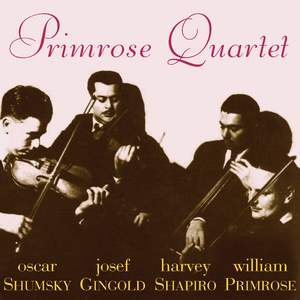
Primrose Quartet
The Complete RCA Victor Recordings
Jesús María Sanromá (piano)
rec.1940-41, New York
Biddulph Recordings 85023-2 [3 CDs: 169]
During the brief period of its existence, the Primrose Quartet released three commercial sets on 78s: the Schumann Piano Quartet with Jesús María Sanromá, Haydn’s The Seven Last Words and Smetana’s String Quartet No 1. In an earlier 2-CD release by Biddulph three decades ago (LAB 052-53), the label included the unissued Brahms Quartet but not the Mozart Quartet in G, K.387 – which appeared on The Strad 7 – or Tchaikovsky’s Scherzo from the Third String Quartet. This 3-CD brings everything together very satisfactorily.
When a quartet has the personnel of this one – Oscar Shumsky, Josef Gingold, William Primrose, Harvey Shapiro – you can expect the ultimate in technical address. However, the group, formed in 1939 under aegis of the NBC as all four members were then playing for Toscanini’s NBC Orchestra, was not to last long. Strangely – or not so strangely when one considers its limited life and the equally limited opportunities for busy orchestral musicians to rehearse – the recordings are somewhat uneven in quality. Despite Primrose’s proud boast that no quartet possessed ‘the instrumental ability of my quartet’ this isn’t quite the same thing as quartet primacy.
The Mozart is a lovely performance, buoyant, vibrant, refined, elegant and suffused with expressive clarity. There are some studio noises in the Menuetto – maybe that contributed to it not being released at the time. Schumann’s Piano Quintet lacks the communicative esprit of the Mozart as well as its recorded brightness. It also lacks the generous romanticism brought by the Busch Quartet and Rudolf Serkin, preferring a more modified rapture, a greater concentration on clarity rather than density of sound. Some crunchy transfer sounds hardly mar things.
The quartet can be heard at its very best in Haydn, which it played – along with the Smetana – at its first New York concert in February 1940, which Olin Downes heard and admired. This was the precise time when they recorded the Haydn, though they returned to it a year later, presumably for retakes. As well as being one of the group’s greatest achievements it was the first recording of the work in the string quartet version, and it’s full of salient and touching expressive detailing, rich inner voices and sonorous beauty. Both Gingold and Primrose had been students of Ysaÿe back in the ’20s and shared something of his aesthetic, at least at this time – before Primrose became a member of the Heifetz orbit and his tone underwent a clear tonal change.
Brahms’s Third Quartet is another lovely performance notable for its litheness and avoidance of Germanic heaviness, perhaps exemplifying something Brahms apparently said about it taking a French quartet to show Germans how his music should sound, on the occasion when the Geloso Quartet, of which Pierre Monteux was violist, came to play one of his quartets to him. This is certainly a lyric and fluidly accomplished reading – Shumsky is especially dashing in the finale and the quartet can be savoured lilting gorgeously in the same movement’s variations.
Smetana’s Quartet is clearly a superb vehicle for Primrose’s solos which are rich and resonant, but it’s a predominantly objectified reading, and actually lacks the passionate conviction of another American group, who also recorded it at around the same time. Despite their clearly less exalted technical standards the Curtis had nurtured their repertoire and turn in a finer reading than the Primrose, as do the Prague and Ondříček Quartet quartets in their 78 sets.
The notes by Wayne Kiley are largely the same as those for Biddulph’s 1992 release but have been lightly revised. Unfortunately, in my copy of the booklet, a copy-and-paste glitch means that the Mozart, Schumann, Brahms and Smetana works bear exactly the same movement timings. The transfers are the same, the work of Mark Obert-Thorn (Brahms and Smetana) and Ward Marston (Haydn, Mozart, Schumann and Tchaikovsky) but have also been revisited to draw the sound forward. This brings more surface noise with it but in a more-than-acceptable compromise.
These recordings have been away too long so it’s a warm welcome back to them in this improved and expanded Biddulph set. For all my quibbles about performances, this constitutes a formidable body of work and repays close listening for the enjoyment, and occasional disappointment, it brings.
Jonathan Woolf
Help us financially by purchasing from


Contents
Wolfgang Amadeus Mozart (1756-1791)
String Quartet No 14 in G major, K.387 ‘Spring‘ (1782)
Robert Schumann (1810-1856)
Piano Quintet in E-flat, Op 44 (1842)
Joseph Haydn (1732-1809)
The Seven Last Words of Christ, Hob.III.50-56 (1785)
Pyotr Ilyich Tchaikovsky (1840-1893)
String Quartet No 3 in E-flat minor, Op 30: Scherzo only (1876)
Johannes Brahms (1833-1897)
String Quartet No 3 in B-flat major, Op 67 (1876)
Bedřich Smetana (1824-1884)
String Quartet No 1 in E minor “From my Life” (1876)


















